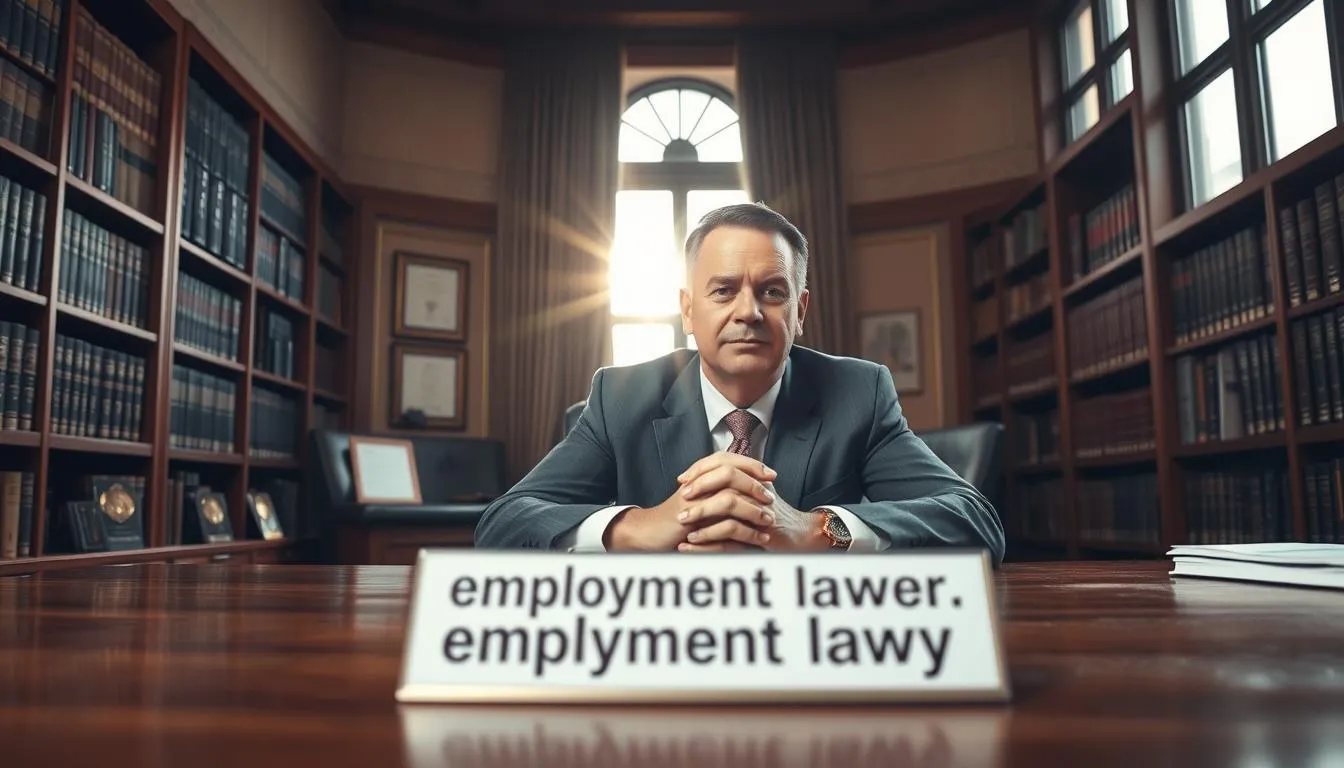Nowadays, knowing about your job rights is very important. Top-rated employment lawyers help keep your workplace rights safe. They help you deal with tough situations at work. If you are treated unfairly or have problems about your rights, getting help from a skilled employment lawyer helps a lot.
These experts know a lot about job laws and give you advice to protect your interests. If you want to make sure your job rights are respected, find a trusted employment lawyer to help you.
A professional “employment lawyer” stands resolute, their silhouette commanding attention against a backdrop of towering skyscrapers. Sunlight filters through the windows, casting a warm glow on their confident expression as they advocate for their client’s rights. Their tailored suit conveys an aura of authority, while their posture exudes unwavering determination. The composition is carefully balanced, with the lawyer in the foreground and the city skyline receding into the distance, emphasizing the lawyer’s role as a guardian of workplace justice.
What Is an Employment Lawyer?
An employment lawyer knows a lot about labor laws and job rights. They help people with work problems like unfair firing and discrimination.
But they do more than fight in court. They also help make deals and guide on job rules. They make sure workers get treated fairly. Knowing what they do can really help if you have work troubles.
When to Consult an Employment Lawyer
Workers should think about asking a lawyer for help with job problems. When they face harassment or unfair treatment, they really need a lawyer’s help. If someone gets fired wrongly, they must understand their rights. A lawyer can guide them through these tough times.
Also, if there are issues with pay or benefits, it’s smart to get legal advice. Talking to a lawyer can show if rules were broken. When dealing with job contracts or leaving a job, a lawyer’s advice is very helpful. This makes sure workers are treated right. Knowing when to get legal help is important for workers to stand up for themselves.
How to Choose the Right Employment Lawyer
Finding the right employment lawyer is important. Start by looking at their experience in employment law. The kind of cases they’ve worked on, like workplace fairness or pay issues, matters a lot.
Looking at what other clients say can help too. Happy clients usually mean the lawyer does a good job. It shows they’re reliable and care about their cases.
It’s a good idea to meet the lawyer first. This lets you talk about your case and ask questions. Notice if they really listen and explain things clearly. This is key for working well together.
The Benefits of Hiring an Employment Lawyer
An employment lawyer can help a lot with job issues. They know the law well. This makes sure your work rights are protected. They can help if you are unfairly fired or treated badly.
They can really boost your chances of winning in work disputes. They look at your case closely. They plan well to get a good deal for you. This is often better than if you tried on your own.
Having an employment lawyer helps you feel less stressed. It’s tough facing problems at work alone. But with a lawyer, you feel braver. Knowing someone smart is on your side helps a lot.
A well-lit office setting with a “employment lawyer” sitting at a wooden desk, hands clasped pensively. Bookshelves and awards lining the walls exude an air of expertise and professionalism. Sunlight filters through large windows, casting a warm, authoritative glow. The lawyer’s expression conveys a sense of capability and trustworthiness, ready to guide clients through complex legal matters. In the foreground, a placard or nameplate clearly displays the “employment lawyer” title. The overall atmosphere evokes a confident, reassuring environment where employees can seek skilled counsel to safeguard their rights.
Understanding Employment Contracts
An employment contract is a vital paper. It talks about the job details between a worker and a boss. It covers things like how much you get paid, what your job is, benefits, and how you can be let go. Knowing these things is very important. It helps workers protect themselves and make smart choices. Learning how to talk about your contract can help you get better job terms.
Before you sign a job contract, talking to a work lawyer is a smart move. A lawyer can look over the contract for you. They can spot any bad terms and make sure your rights are safe. This check helps explain what you and your boss must do and the good stuff you get. It makes people feel good when they start a new job.

Navigating Workplace Discrimination Claims
Workplace discrimination is a big problem in many jobs. It can happen because of race, gender, age, or disability. Laws protect workers from this. The Equal Employment Opportunity Commission (EEOC) is one group that helps.
Filing a discrimination claim can be very hard. A lawyer can help you understand and deal with it. They help collect proofs and record bad behavior.
Laws are there to make sure everyone has a fair chance at work. Talking to a lawyer can help a lot if you face discrimination. They can fight for you, talk about settlement, or get ready for court. Knowing your rights is important, and a lawyer makes sure they are respected.
The Impact of Employment Law Changes
Recent changes in employment law affect workplace rights all over. It’s key for everyone at work to stay current. These changes, like new minimum wage laws and paid leave rules, change employee rights.
Understanding these updates helps employees know their rights.
An employment lawyer helps clients grasp these changing laws. They guide on following the rules and knowing your rights at work. This is very important as job laws keep changing with what people need and expect.
Getting Started: Your First Steps
Are you having trouble at work and think your rights are in danger? Start by writing down what’s happening. Note any times your rights might have been broken. This will sort out your thoughts and help you explain things later.
After writing everything down, think about meeting with lawyers who know about employment. Many lawyers don’t charge much for a first meeting. You can tell them about your problems and ask how they would handle things. Bring any important emails or reports to show them.
Get ready for your meetings carefully. List the problems and what you wish to happen. This will help you feel strong in your talks. It will help you use your time well with the lawyer. Starting like this is a good step towards keeping your rights safe at work. visit here for more info.
FAQ
What does an employment lawyer do?
An employment lawyer knows a lot about job laws. They help people with job problems like unfair firing and not fair treatment.
When should I consult an employment lawyer?
If bad things happen to you at work, talk to this lawyer. They help with contract talks and when you’re not getting paid right.
How do I choose the right employment lawyer for my case?
Look for a lawyer who knows a lot about job laws. They should have good reviews. Meet with them to see if they can help you.
What are the benefits of hiring an employment lawyer?
With a lawyer, you have a better chance to win your case. They protect your work rights and help make talking easier. Lawyers also make hard legal stuff less stressful.
Why should I have my employment contract reviewed by a lawyer?
A lawyer makes sure you understand your work contract. This includes pay and when you can be let go. It stops bad surprises by making your rights clear.
What should I do if I face workplace discrimination?
If you are treated unfairly at work, write down what happens. Then, talk to a lawyer. They can help you with your rights and how to make a claim.
How have recent employment law changes affected my rights?
New job laws can change how much you’re paid and your break time. A lawyer can help you understand these new rules and what they mean for you.
What steps should I take before meeting with an employment lawyer?
Write down what’s wrong at work. Bring any important papers. Make a list of questions. This helps make your meeting with the lawyer better.
















